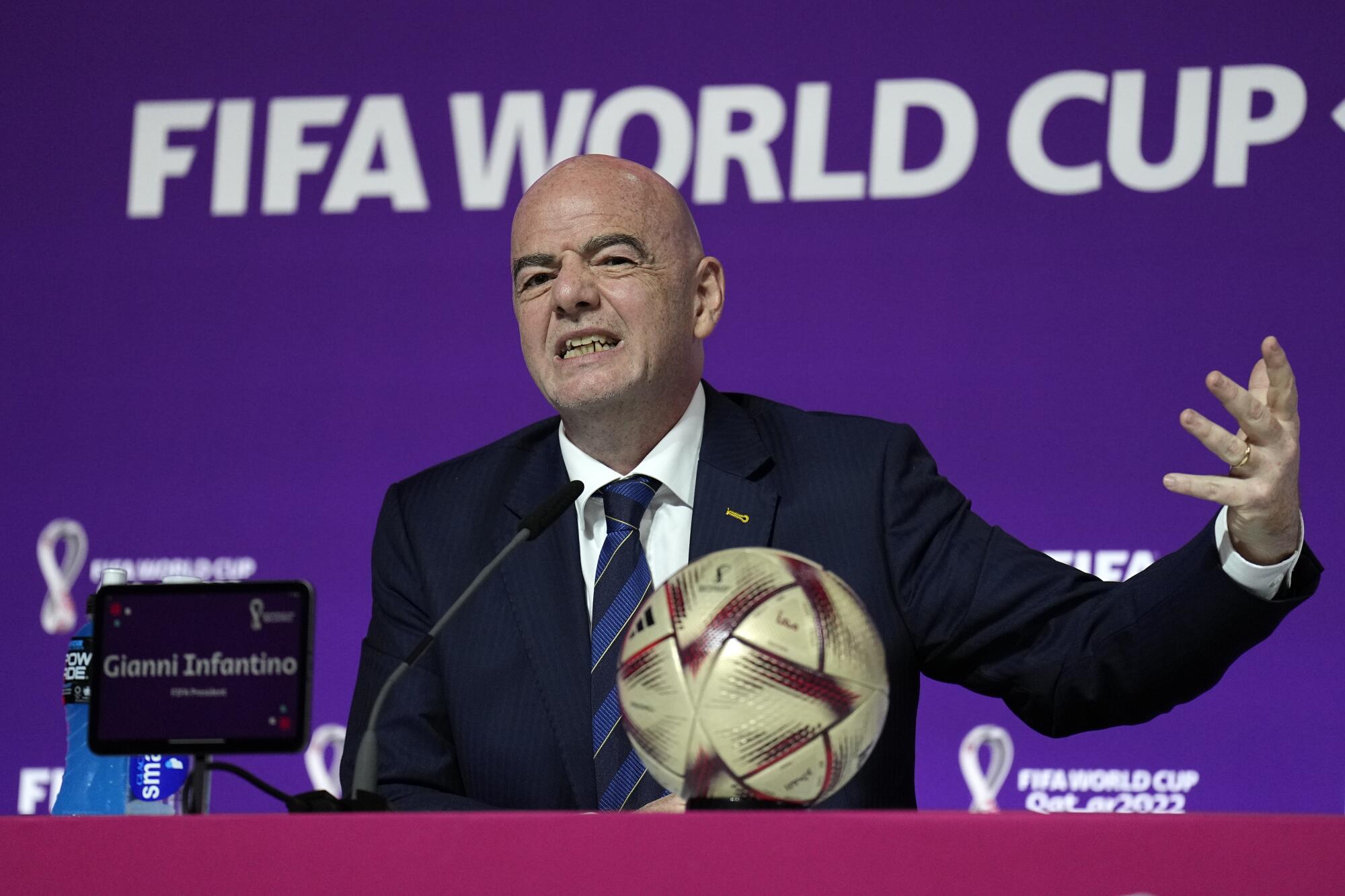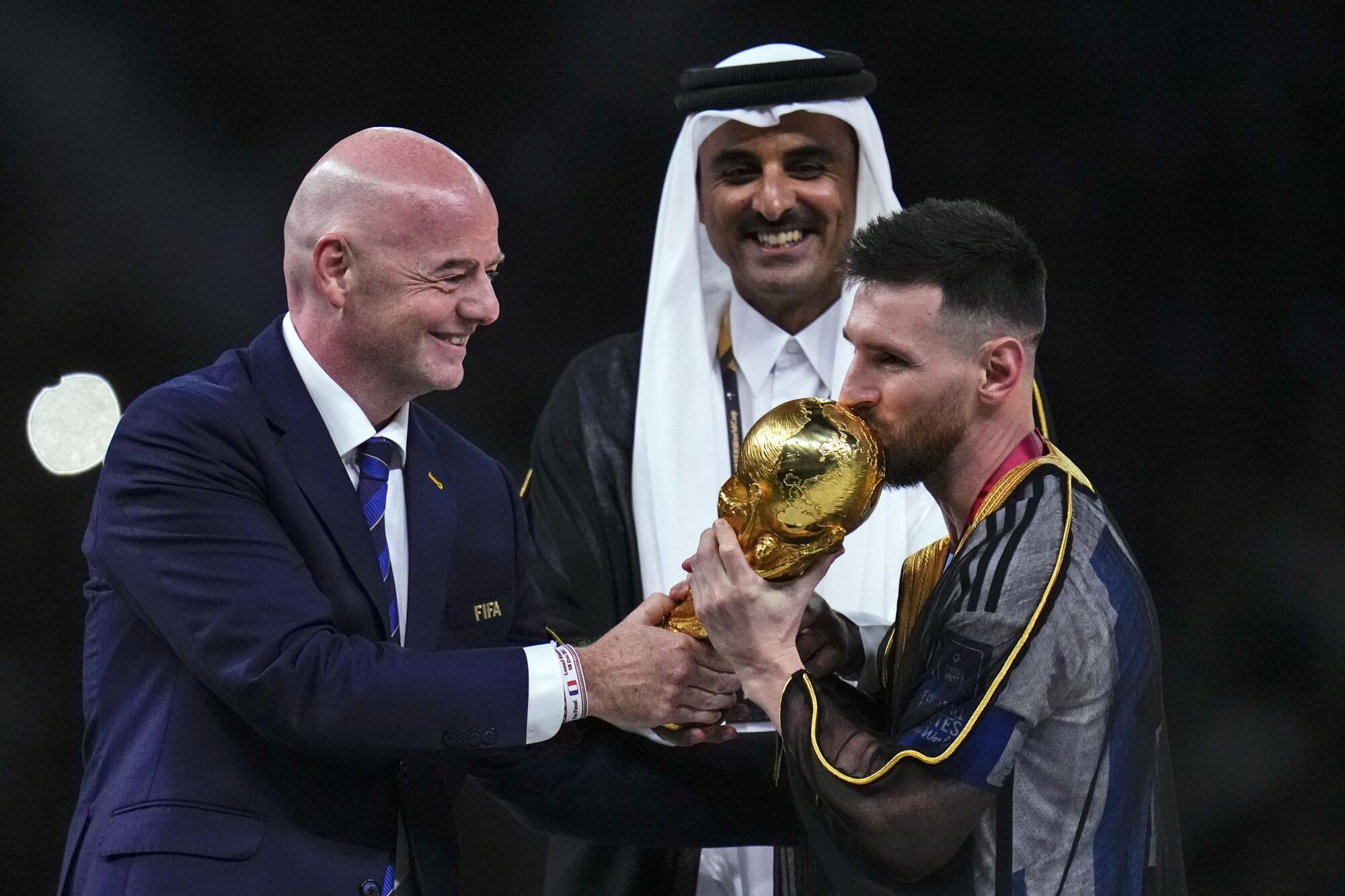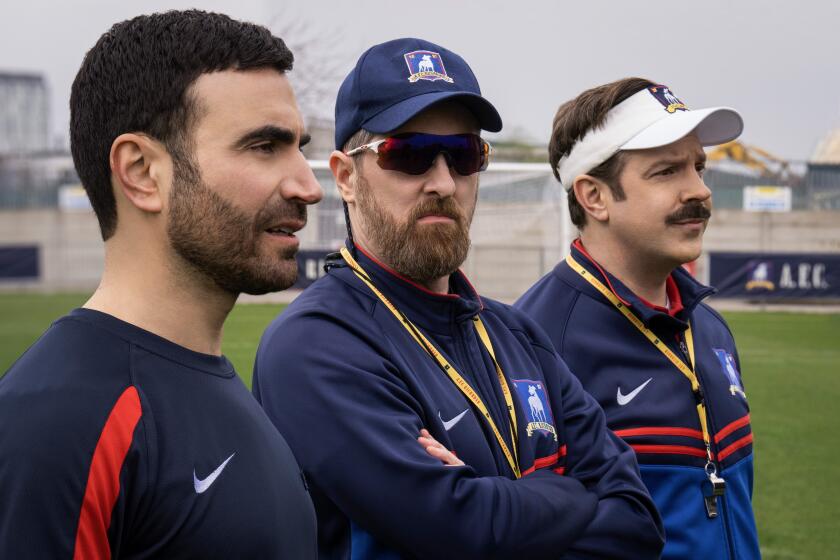
- Share via
Gianni Infantino was reelected to another four-year term as FIFA president last month, running unopposed and winning by acclaim. That means no formal vote was taken, saving Infantino the embarrassment of failing to win unanimously in a race no one else was contesting.
Lise Klaveness, president of the Norwegian soccer federation, publicly said she would not back Infantino. But while Klaveness, discouraged by Infantino’s craven ignorance of the human rights issues surrounding last year’s World Cup in Qatar, was prepared to vote with her conscience, most of the other delegates at the FIFA Congress voted with their pocketbooks.
U.S. men’s national team coach Anthony Hudson almost left the World Cup to help his dogs. His dedication to helping dogs in need fuels him off the field.
FIFA’s 211 member federations have seen their annual funding from world soccer’s governing body rise from $250,000 to $2 million since Infantino first took office in 2016. The Qatar World Cup left FIFA with $4 billion in reserves, and Infantino is forecasting revenue of at least $11 billion through the next World Cup in North America in 2026.
For an organization that has long seemed to put profit over propriety, that was all worth voting for. But how much has that money cost?
Infantino has long courted controversy, partnering with authoritarian regimes in Russia and Qatar to host the last two World Cups. And while his supporters are correct to say both countries were awarded the tournaments before Infantino took charge, FIFA’s president made no secret of his admiration for Russia’s outlaw President Vladimir Putin, accepting the country’s prestigious Order of Friendship from him in a Kremlin ceremony in 2019. He then prostrated himself before the Qataris on the eve of the last World Cup, reneging on agreements to permit beer sales at tournament venues and banning displays of solidarity with migrant workers, the LGBTQ community and Iranian protesters inside stadiums to keep the country’s ruling family happy.
It was a disappointing transformation for someone who was considered a reformer when he was chosen in 2016 to fill out the remainder of Sepp Blatter’s scandal-plagued final term as president before winning a four-year term of his own in 2019. Infantino was even a member of FIFA’s Reform Committee before, as president, largely abandoning calls for reform while overseeing a massive surge in revenue.
For Infantino, bigger is always better. More is preferable to less. His strategy has been to try to increase the size and even the frequency of FIFA competitions. His vision, supporters say, is to make soccer truly global and available for all. That requires investment as well as financial management, governance and transparency.
But it also requires more and bigger competitions. So the World Cup will jump from 32 to 48 teams in 2026, while the number of games played will go from 64 to 104. A plan to play the tournament every two years instead of every four was discussed two years ago but quietly forgotten.

The club World Cup, an annual tournament involving seven teams, will grow to 32 entrants and be played every four years beginning in 2025. Steven A. Bank, the Paul Hastings professor of business law at UCLA and a close observer of soccer finances, says the plan has merits but warns that it may prove to be too much.
“From the perspective of currying favor among smaller nations — which has been the campaign tactic for FIFA president candidates for decades — the expanded World Cup is a clear winner because it increased access for more of those countries to qualify,” he said. “It may ultimately damage the golden goose, but right now countries just want greater chances to get there.
“A club World Cup probably doesn’t have the same individual benefit, but a lot of confederations look at UEFA’s Champions League and want to get involved in something like that.”
Not everyone is happy with the changes. National leagues say Infantino is crowding the calendar with too many FIFA competitions while the international players union FIFPRO said the expanded men’s and women’s World Cups, in addition to other competitions, “have created new conditions that further increase pressure on players’ workload and their jobs.”
Apple TV+ executives say ‘Ted Lasso’s’ success didn’t inform their landmark deal with the MLS — but it also didn’t hurt.
In 2025, a Premier League player who is also a member of his national team could be asked to participate in five international events and eight club competitions. It’s hard to imagine the quality of play withstanding such pressure.
“When I hear there is too much football, yes, maybe in some places, but not everywhere,” Infantino said. “In fact, in most parts of the world there is not enough football played. We need way more and not less competitions; we want football to develop worldwide.”
Those comments clearly weren’t directed at a European audience — and with reason. UEFA, the FIFA confederation representing Europe, has 55 members; the rest of the world has 156, many of those in the developing world. And with FIFA operating under a one-nation, one-vote system, those are the federations the president is wooing, which is why last month’s FIFA Congress was held in Rwanda and not Rotterdam, the Netherlands. (That decision also put Infantino in bed with another outlaw government since Rwanda’s leaders are guilty of repression and significant human rights abuses.)
“These reforms may be unpopular for big leagues and their fans, but they’re probably viewed as positive in a lot of places outside Europe,” said Bank, who is no fan of the FIFA president. “Infantino may be selling FIFA out for short-term political gain, but he can spin them as increasing access and thereby growing the games internationally for the benefit of everyone.”
That’s not to say Infantino hasn’t done some big, important things, probably another reason he ran unopposed. The jump in revenue, for example, is mind-boggling and points to both the health and popularity of the game, as does the fourfold increase in FIFA’s reserves. And that financial security has helped fund a seven-fold increase in investment in soccer development since 2016.
America Ferrera is among the Hollywood celebrities who’ve used their Angel City soccer club ownership stakes as a way to help people and the community.
Women’s soccer has also benefited under Infantino, with this summer’s World Cup expanding to 32 teams across two countries. The prize-money purse for the tournament has also grown, jumping from $30 million to $150 million. All while that’s still a third of what FIFA has made available for the men’s tournament, in the last Women’s World Cup before Infantino, in 2015, the total purse was just $15 million. At last month’s Congress, Infantino said he is considering expanding opportunities for women even further by organizing a club World Cup and a FIFA World Series every two years.
FIFA has also launched a talent development scheme under the direction for former Arsenal manager Arsene Wenger and reformed the transfer system, improving the transparency, integrity and fairness of the system.
What FIFA lacks, however, is something beyond the self-aggrandizing Infantino’s strategy of relentless expansion. More, more, more is not a sustainable approach; in fact, it feels like overkill. And to keep revenues growing at anything close to the current pace, Infantino will have to continue cozying up to authoritarian states such as Russia, China, Saudi Arabia and the UAE, whose leaders share more than a kinship with him.
They also win elections in which nobody bothers to count the votes.
⚽ You have read the latest installment of On Soccer with Kevin Baxter. The weekly soccer column will take you behind the scenes and shine a spotlight on unique stories. Look for it every Tuesday morning at latimes.com/soccer. Listen to Kevin Baxter on this week’s episode of the Corner of the Galaxy podcast.
More to Read
Go beyond the scoreboard
Get the latest on L.A.'s teams in the daily Sports Report newsletter.
You may occasionally receive promotional content from the Los Angeles Times.










